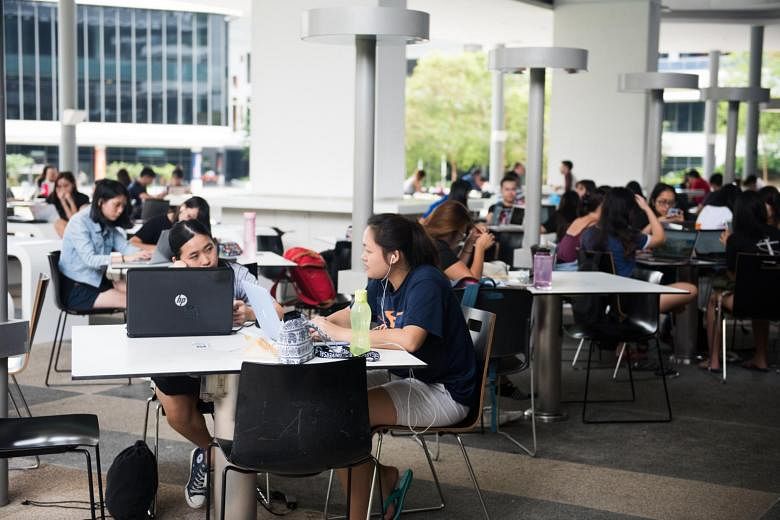SINGAPORE - Of the 7,800 undergraduates admitted to the National University of Singapore (NUS) last year, about 1,200 were polytechnic graduates.
The number is likely to rise further this year, with the university launching a special admission scheme for those demonstrating entrepreneurship abilities.
NUS, which runs a programme to nurture entrepreneurs in different business nodes of the world, has asked the five polytechnics to nominate students who have displayed a strong entrepreneurial inclination during their diploma studies. This includes those who have participated in entrepreneurship-related programmes while at their polytechnics.
The university expects to consider up to 200 nominated polytechnic students in total, with each polytechnic nominating up to 40 students.
If their academic results do not meet the NUS admissions requirements, they will be considered under the Aptitude Based (Discretionary) Admissions Scheme.
Said NUS senior deputy president and provost Ho Teck Hua, who announced the new scheme on Friday morning (Feb 8): "NUS is a forerunner and key player in Singapore's entrepreneurial ecosystem, and we hope to position Singapore strategically as a key node in our innovation and enterprise network.
"As part of this effort, we are constantly looking for students with entrepreneurial inclinations to provide them with a pathway to realise their entrepreneurial ambitions."
He added that students admitted under this new scheme stand to gain from NUS' active industry partnerships and experiential entrepreneurial education, such as the highly popular NUS Overseas Colleges (NOC) Programme. Since 2002, more than 2,800 NOC alumni have established over 370 companies globally, more than a dozen of which have been acquired.
Yet another boost being given to polytechnic graduates is the bonus admission points scheme.
Last year, to encourage and support students to pursue their passions, NUS awarded 1.25 bonus admission points to A-level students applying for their first-choice programmes. That resulted in 9 per cent more A-level applicants - about 700 students - being offered admission to their top choice courses.
Professor Ho said a preliminary analysis revealed that students who were admitted into their first-choice courses through the bonus admission points scheme are doing as well as students who were admitted into the same courses without the bonus points.
Following these encouraging results, NUS will be extending the scheme to students with polytechnic and International Baccalaureate qualifications this year. NUS expects more applicants to be offered their first choice as a result of this policy.
Prof Ho also announced that from the new academic year starting in August, NUS students will be able to design their own module, including how they learn and who they learn from, for one portion of their curriculum.
Under the optional Design-Your-Own-Module (DYOM) initiative, undergraduate students may take up to four modular credits from their Unrestricted Electives Modules (UEM) to pursue subjects that contribute to their personal and professional growth.
Students have to organise themselves into a group of at least 10 and submit a proposal to an NUS faculty mentor for review and approval. Students can either invite a guest speaker from industry to tutor them on a subject - for instance fintech, urban sustainability, or the fine arts - or they may select modules from a suite of online courses offered by edX, a not-for-profit massive open online course (MOOC) provider.
NUS students will interrogate the relevant learning materials guided by the faculty mentor, who will also set assignments, supervise discussions and ensure demonstrations of competence in the field of study.
Students may choose to do a four-credit module (120 hours of work) or a two-credit module (60 hours of work). All DYOM modules will be graded on a satisfactory/unsatisfactory basis and will not contribute any marks towards a student's cumulative average point.
Prof Ho explained: "The exciting new Design-Your-Own-Module initiative dramatically broadens the range of modules offered by NUS and will better prepare our students for lifelong learning. Students can now pursue knowledge in niche areas currently not offered by NUS courses and access top university courses as well as teaching by industry leaders."
Prof Ho said the new initiatives are designed to encourage students to take greater ownership of their learning journeys to better pursue their passions.
He said students who enjoy what they are learning tend to be more motivated and are more likely to do well. "At NUS, we constantly ask ourselves how the university can better encourage, facilitate and support students in embracing lifelong learning and pursuing their passions.
"In the new academic year, we are doubling our efforts by offering students the flexibility to chart their own learning journeys and opening access to NUS' unique entrepreneurial education pathway to poly graduates. In the long run, we hope to nurture highly motivated, self-directed learners."


